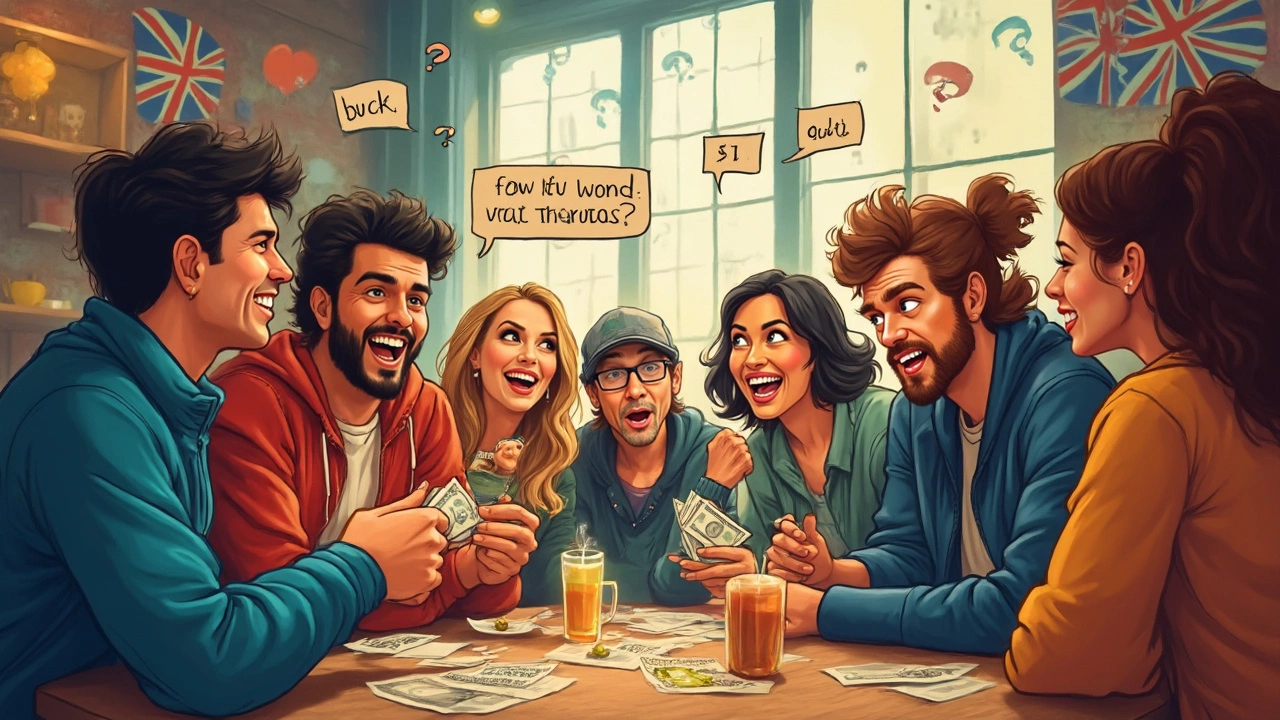Slang for a $1 Bill: What People Actually Say

Ever tried to buy something small and heard someone say, "Just a buck" instead of "one dollar"? You’re not alone if you wondered where that nickname came from—or if there are other words for a $1 bill.
When people talk money in the U.S., nobody actually says "pass me a one-dollar bill." Instead, you’ll hear "buck," "single," or even "one-spot". These are way more common, especially when talking quickly or casually. If you’re in a store grabbing something off a shelf, the cashier is much more likely to say, "That’s two bucks," not "two dollars." It’s part of normal, everyday American talk.
Knowing these terms makes life easier when you’re handling small cash transactions or just trying to understand what everyone around you is saying. Besides "buck," there are some quirky origins and regional favorites worth knowing. And if you’re stacking dollar bills to organize your shelf or cash register, these words pop up all the time—it's like money has its own secret language.
- The Most Popular Slang Terms for $1 Bills
- How ‘Buck’ Became the Go-To Term
- Other Names You Might Hear
- Slang for Dollars in Everyday Life
The Most Popular Slang Terms for $1 Bills
The $1 bill has a few famous nicknames that people use every day. The top slang word by far is buck. Seriously, if you hear someone say, “That movie costs ten bucks,” they’re talking about $10, not a rare animal.
Besides "buck," people say “single” when they want to be clear they're talking about just a one-dollar note. You might hear, “Can you break a five? I need singles for the vending machine.” There’s also "one," like, “I’m short one.” These are common in most parts of the United States, especially in cities and places where quick transactions happen, like small shops or coffee counters.
- Buck – Most common and used everywhere. Origin has a quirky back story involving deer skins (we’ll get to that in the next section).
- Single – Used when talking about bills in bulk, like in banks or retail. “I need five singles, please.”
- One – Basic, but people use it to mean a one-dollar bill.
- One-spot – Not as common, but you’ll sometimes hear this in older movies or by folks who love classic slang.
A 2023 survey by YouGov polled Americans on what they call the $1 bill the most. Here’s a quick breakdown:
| Slang Term | Percentage Using |
|---|---|
| Buck | 79% |
| Single | 12% |
| One | 6% |
| One-spot | 2% |
| Other | 1% |
As money expert David Stein said in an interview with NPR,
“If you’re in America and you want to be understood, saying ‘buck’ for a dollar just makes things go smoother.”
So, if you’re out shopping or counting out cash for shelving products, these are the words you’ll want to know. You’ll hear them everywhere—from coffee runs to garage sales. Keeping them in mind saves you from blank stares and helps streamline your money talk.
How ‘Buck’ Became the Go-To Term
It’s funny how you hear “buck” thrown around so much that you might never stop to think about where it comes from. But the story behind this slang for the dollar bill is pretty wild—and it’s all about actual animal skins. Back in the 1700s and early 1800s, buckskins (deer hides) were like cash in what’s now the U.S. You could literally trade a buckskin for supplies or goods. The word “buck” stuck around even after paper money took over.
Using "buck" means you’re tapping into some real American history. By the late 1800s, “buck” meant one dollar in newspapers and books. From there, it just took off—and now you’ll catch it in stores, movies, and every neighborhood in America.
Here’s a quick look at how "buck" has appeared over the years:
| Year | Use of 'Buck' for Dollar |
|---|---|
| 1700s | Buckskins used as currency, word takes hold |
| 1856 | First published use of "buck" as slang for a dollar |
| 1920s | "Buck" becomes mainstream in conversations |
| Now | Nobody even thinks twice—it's just what we say |
So if you’re talking money and want to sound like you know what’s up, “buck” is the safest bet. Whether it’s at a flea market, a coffee shop, or even on a garage shelf where you’re counting registers, nobody will be confused if you call a one-dollar bill a buck. It works anywhere, anytime, and pretty much with anyone.

Other Names You Might Hear
If you think calling a $1 bill just a buck is the end of the story, there’s more to it. People have come up with several other ways to talk about a single dollar. Some sound super casual, some a bit old-school, but you’ll hear them if you hang around long enough—especially in busy retail settings or among friends splitting costs.
Here are the most common alternatives you might catch when people are talking about $1 bills:
- Single: Cashiers or bartenders will often say, “Do you have a single?” if they need a $1 bill for change. Simple and straight to the point.
- One: People might just say, “Can you break a one?” instead of “Can you break a one-dollar bill?” It's quick and gets the job done.
- One-spot: This one’s less common but still used, especially among folks who handle cash a lot. For example, someone stocking a tip jar might ask for a few “one-spots.”
- George: This is a less frequent term, coming from George Washington’s face on the $1 bill. It’s more of a fun nickname than something you’ll hear every day, but it still pops up in old movies or from folks who love a bit of nostalgia.
According to a survey done by the Federal Reserve in 2022, 58% of Americans said "buck" was their go-to slang for a dollar, but "single" came in second at 28%. The other terms are much less common, but you'll still run into them—especially if you travel across the U.S.
| Slang Term | % Usage |
|---|---|
| Buck | 58 |
| Single | 28 |
| One | 8 |
| One-spot | 4 |
| George | 2 |
For a little perspective, here's a quote from David Schwartz, author of 'The History of Money Slang':
“Slang for money changes the way we talk about it—sometimes making things less formal and a lot more fun. From 'buck' to 'George,' these words are all over American culture.”
So next time someone talks about a "one-spot" or asks for a "single" at the register, you’ll know exactly what’s up. And if you use one of these yourself, don’t be surprised if someone nods in recognition—they’re all part of the everyday language of cash.
Slang for Dollars in Everyday Life
You’ll bump into dollar slang whenever you’re shopping, splitting a bill, or talking to a friend about money. The word "buck" shows up everywhere. Kids ask their parents, “Can I have a buck for the vending machine?” Adults talk about gas money, groceries, or rent in terms of “bucks,” not dollars. It’s short, easy, and everyone understands it.
Another term you might hear is "single" when someone is talking about one-dollar bills specifically. People working cash registers, like at coffee shops or small booths, often say, “I need more singles in the till.” If you’re ever making change or organizing a shelf of supplies that includes a cash section, knowing what "singles" means can help things go smoother and quicker. "One-spot" is pretty rare, but some folks do use it, especially when counting bills out loud.
Here’s a quick snapshot from a 2023 street poll in New York City that looked at what people called a $1 bill most often in conversation:
| Term | How Often Used | Common Situation |
|---|---|---|
| Buck | 76% | Everyday purchases, quick chat |
| Single | 17% | Making change, working registers |
| One-spot | 4% | Counting or stacking cash |
| Dollar | 3% | Formal conversations, beginners |
Little tricks help in daily life, too. If you’re sorting cash, grab your singles and stack them together for easy counting. If someone says “two bucks for a soda,” you know exactly what they mean. When you’re new to working a slice shop or setting up your own business, remember that "singles" keep things running smooth.
Next time you hear these words, you won’t have to guess what’s being talked about. You’ll be ready to chime in or count your own cash like a pro.





